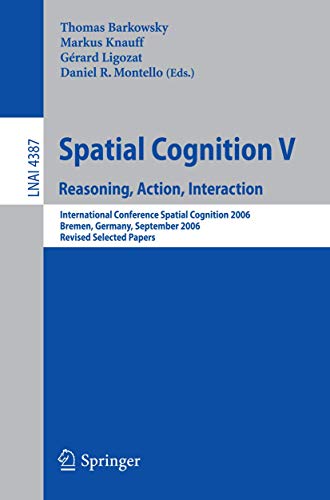Spatial Cognition V: Reasoning, Action, Interaction (Lecture Notes in Computer Science / Lecture Notes in Artificial Intelligence) (Lecture Notes in Computer Science, 4387, Band 4387) - Softcover

Inhaltsangabe
This book constitutes the refereed proceedings of the International Conference on Spatial Cognition, Spatial Cognition 2006. It covers spatial reasoning, human-robot interaction, visuo-spatial reasoning and spatial dynamics, spatial concepts, human memory, mental reasoning and assistance, spatial concepts, human memory and mental reasoning, navigation, wayfinding and route instructions as well as linguistic and social issues in spatial knowledge processing.
Die Inhaltsangabe kann sich auf eine andere Ausgabe dieses Titels beziehen.
Weitere beliebte Ausgaben desselben Titels
Suchergebnisse für Spatial Cognition V: Reasoning, Action, Interaction...
Spatial Cognition V: Reasoning, Action, Interaction : International Conference Spatial Cognition 2006 Bremen, Germany, September 24-28, 2006 Revised Selected Papers
Anbieter: Revaluation Books, Exeter, Vereinigtes Königreich
Paperback. Zustand: Brand New. 1st edition. 500 pages. 9.00x6.00x1.00 inches. In Stock. Artikel-Nr. x-3540756655
Neu kaufen
Versand von Vereinigtes Königreich nach USA
Anzahl: 2 verfügbar
Spatial Cognition V
Anbieter: buchversandmimpf2000, Emtmannsberg, BAYE, Deutschland
Taschenbuch. Zustand: Neu. Neuware -This is the fifth volume in a series of book publications featuring basic interdisciplinary research in spatial cognition. The study of spatial cognition is the study of knowledge about spatial properties of objects and events in the world. Spatial properties include location, size, distance, direction, separation and connection, shape, pattern, and so on. Cognition is about the structures and processes of knowledge: its acquisition, storage, retrieval, manipulation, and use by humans, nonhuman animals, and machines. Broadly construed, cognitive activities include sensation and perception, thinking, attention, imagery, attitudes, memory, learning, language, and reasoning and problem-solving; the interaction of these activities with motoric (body movement) and affective (emotional) processing is recognized as critically important, as well. Cognition is typically considered to make up much of the activity of the mind. But though the mind is an expression of the structures and processes of the brain and nervous system, it is also an expression of an organism or agent with a physical body that typically exists in a physical and socio-cultural world. Researchers study spatial cognition for several reasons. Spatial cognition plays important roles in most of the domains of knowledge and behavior of sentient beings, including activities associated with biological survival, social interaction, cultural practice, and economic exchange. Attempts to describe, predict, and explain the basic components of spatial cognition and their interrelationships stimulate a host of interesting basic questions about how important parts of reality work.Springer Verlag GmbH, Tiergartenstr. 17, 69121 Heidelberg 524 pp. Englisch. Artikel-Nr. 9783540756651
Neu kaufen
Versand von Deutschland nach USA
Anzahl: 2 verfügbar
Spatial Cognition V : Reasoning, Action, Interaction
Anbieter: AHA-BUCH GmbH, Einbeck, Deutschland
Taschenbuch. Zustand: Neu. Druck auf Anfrage Neuware - Printed after ordering - This is the fifth volume in a series of book publications featuring basic interdisciplinary research in spatial cognition. The study of spatial cognition is the study of knowledge about spatial properties of objects and events in the world. Spatial properties include location, size, distance, direction, separation and connection, shape, pattern, and so on. Cognition is about the structures and processes of knowledge: its acquisition, storage, retrieval, manipulation, and use by humans, nonhuman animals, and machines. Broadly construed, cognitive activities include sensation and perception, thinking, attention, imagery, attitudes, memory, learning, language, and reasoning and problem-solving; the interaction of these activities with motoric (body movement) and affective (emotional) processing is recognized as critically important, as well. Cognition is typically considered to make up much of the activity of the mind. But though the mind is an expression of the structures and processes of the brain and nervous system, it is also an expression of an organism or agent with a physical body that typically exists in a physical and socio-cultural world. Researchers study spatial cognition for several reasons. Spatial cognition plays important roles in most of the domains of knowledge and behavior of sentient beings, including activities associated with biological survival, social interaction, cultural practice, and economic exchange. Attempts to describe, predict, and explain the basic components of spatial cognition and their interrelationships stimulate a host of interesting basic questions about how important parts of reality work. Artikel-Nr. 9783540756651
Neu kaufen
Versand von Deutschland nach USA
Anzahl: 1 verfügbar


